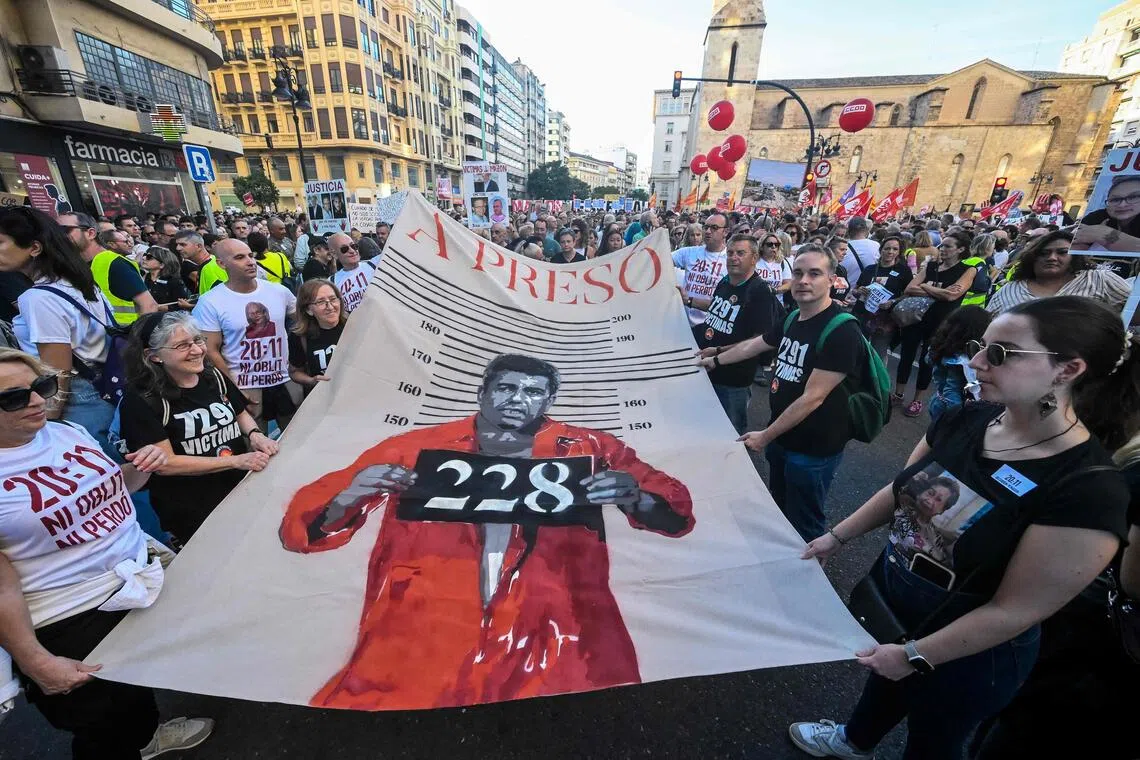‘Why weren’t they evacuated?’: Tens of thousands protest on deadly Spain floods’ anniversary
Sign up now: Get ST's newsletters delivered to your inbox

Protesters in Valencia, Spain, holding a banner depicting regional leader Carlos Mazon, during an Oct 25 march marking the anniversary of floods that killed 229 people.
PHOTO: AFP
Follow topic:
- Valencia saw mass protests on the flood anniversary, with 50,000+ demanding regional leader Carlos Mazon's resignation over slow response.
- Critics cite delayed text alerts, sent after flooding began, and Mazon's lunch during the disaster, causing anger and accusations of negligence.
- Mazon's party backs him to avoid early elections, hoping reconstruction will improve standing, despite 71% of residents wanting him to resign.
AI generated
VALENCIA, Spain – Tens of thousands of people took to the streets of Spain’s eastern city of Valencia on Oct 25 to mark the first anniversary of floods that killed 229 people,
Demonstrators, many carrying photos of the victims, called on regional leader Carlos Mazon to resign over what they say was the slow response to one of Europe’s deadliest natural disasters in decades.
“People are still really angry,” said Ms Rosa Cerros, a 42-year-old government worker who took part with her husband and two young daughters.
“Why weren’t people evacuated? It’s incomprehensible.”
Mr Mazon’s administration has been heavily criticised for not sending text alerts until flooding had already started in some places on Oct 29, 2024.
The messages were sent more than 12 hours after the national weather agency had issued its highest alert level for torrential rains.
Residents told Spanish media that by the time they received the alert, muddy water was already surrounding their cars, submerging streets and pouring into their homes.
The floods hit 78 municipalities, mostly in the southern outskirts of the city of Valencia, killing 229 people in the region. The body of one victim was found as recently as Oct 21.
Despite warning signs, Mr Mazon went ahead with an hours-long lunch with a journalist on the day of the floods, also appearing in photos tweeted by his staff receiving a sustainable tourism certification.
Pressure to resign
“Mazon wasn’t where he should have been that day, he wasn’t up to the task,” said protester Gonzalo Bosch, a 38-year-old accountant from Paiporta, one of the towns worst hit by the floods.
More than 50,000 people took part in the protest, according to the central government’s office in Valencia. The groups that organised the protest did not provide their own estimate.
Demonstrators made their way through the streets of Spain’s third-largest city holding placards calling on Mr Mazon to resign or even be imprisoned.
Under Spain’s decentralised system, disaster management is the regional administration’s responsibility.
But Mr Mazon, a member of the conservative Popular Party (PP) that sits in opposition to the Socialist-led national government, has argued his administration did not have the information needed to warn people sooner.
In a poll published earlier in October in El Pais newspaper, 71 per cent of Valencia residents said Mr Mazon should resign.
Almost half of the people who died in the catastrophic floods were 70 or older, a fact highlighted by some protesters.
They accuse the authorities of having failed to protect the most vulnerable.
‘Deaths were preventable’
Ms Rosa Alvarez, who heads an association representing victims of the floods and was among those leading the march, blames the regional government’s inaction for her 80-year-old father’s death.
He was already drowning by the time the mobile phone alert was issued, she said, the walls of his home in Catarroja already knocked down by the floods.
“Every minute counted that day. When the alarm sounded, people had already drowned or were in real danger,” the 51-year-old social worker told AFP.
“All those deaths were completely preventable.”
Campaigners have staged regular demonstrations against Mr Mazon often on or near the monthly anniversaries of the disaster.
The PP’s national leader, Mr Alberto Nunez Feijoo, continues to back Mr Mazon despite his unpopularity.
Politics professor Anton Losada, of the University of Santiago de Compostela, told AFP “he has no other choice”, referring to Mr Feijoo.
Mr Mazon’s resignation would trigger early elections in Valencia, which would probably be “catastrophic” for both the PP and Mr Feijoo’s leadership, Prof Losada told AFP.
The party is hoping a successful reconstruction effort will help restore its standing, he added. AFP

